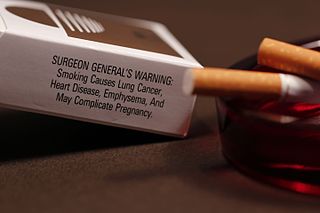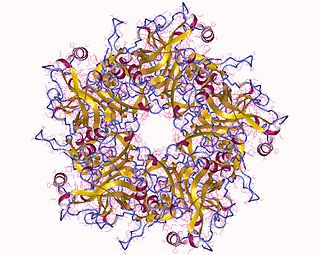
Tobacco smoking is the practice of burning tobacco and ingesting the resulting smoke. The smoke may be inhaled, as is done with cigarettes, or simply released from the mouth, as is generally done with pipes and cigars. The practice is believed to have begun as early as 5000–3000 BC in Mesoamerica and South America. Tobacco was introduced to Eurasia in the late 17th century by European colonists, where it followed common trade routes. The practice encountered criticism from its first import into the Western world onwards but embedded itself in certain strata of a number of societies before becoming widespread upon the introduction of automated cigarette-rolling apparatus.

Cancer is a group of diseases involving abnormal cell growth with the potential to invade or spread to other parts of the body. These contrast with benign tumors, which do not spread. Possible signs and symptoms include a lump, abnormal bleeding, prolonged cough, unexplained weight loss, and a change in bowel movements. While these symptoms may indicate cancer, they can also have other causes. Over 100 types of cancers affect humans.

Human papillomavirus infection is caused by a DNA virus from the Papillomaviridae family. Many HPV infections cause no symptoms and 90% resolve spontaneously within two years. In some cases, an HPV infection persists and results in either warts or precancerous lesions. These lesions, depending on the site affected, increase the risk of cancer of the cervix, vulva, vagina, penis, anus, mouth, tonsils, or throat. Nearly all cervical cancer is due to HPV, and two strains – HPV16 and HPV18 – account for 70% of all cases. HPV16 is responsible for almost 90% of HPV-positive oropharyngeal cancers. Between 60% and 90% of the other cancers listed above are also linked to HPV. HPV6 and HPV11 are common causes of genital warts and laryngeal papillomatosis.

Colorectal cancer (CRC), also known as bowel cancer, colon cancer, or rectal cancer, is the development of cancer from the colon or rectum. Signs and symptoms may include blood in the stool, a change in bowel movements, weight loss, abdominal pain and fatigue. Most colorectal cancers are due to lifestyle factors and genetic disorders. Risk factors include diet, obesity, smoking, and lack of physical activity. Dietary factors that increase the risk include red meat, processed meat, and alcohol. Another risk factor is inflammatory bowel disease, which includes Crohn's disease and ulcerative colitis. Some of the inherited genetic disorders that can cause colorectal cancer include familial adenomatous polyposis and hereditary non-polyposis colon cancer; however, these represent less than 5% of cases. It typically starts as a benign tumor, often in the form of a polyp, which over time becomes cancerous.

The Mediterranean diet is a concept first invented in 1975 by the American biologist Ancel Keys and chemist Margaret Keys. The diet took inspiration from the supposed eating habits and traditional food typical of Crete, much of the rest of Greece, and southern Italy, and formulated in the early 1960s. It is distinct from Mediterranean cuisine, which covers the actual cuisines of the Mediterranean countries, and from the Atlantic diet of northwestern Spain and Portugal. While inspired by a specific time and place, the "Mediterranean diet" was later refined based on the results of multiple scientific studies.

Men who have sex with men (MSM) are men who engage in sexual activity with other men, regardless of their sexual orientation or sexual identity. The term was created by epidemiologists in the 1990s, to better study and communicate the spread of sexually transmitted infections such as HIV/AIDS between all sexually active males, not strictly those identifying as gay, bisexual, pansexual or various other sexualities, but also for example male prostitutes. The term is often used in medical literature and social research to describe such men as a group. It does not describe any specific kind of sexual activity, and which activities are covered by the term depends on context. The alternative term "males who have sex with males" is sometimes considered more accurate in cases where those described may not be legal adults.

Preventive healthcare, or prophylaxis, is the application of healthcare measures to prevent diseases. Disease and disability are affected by environmental factors, genetic predisposition, disease agents, and lifestyle choices, and are dynamic processes that begin before individuals realize they are affected. Disease prevention relies on anticipatory actions that can be categorized as primal, primary, secondary, and tertiary prevention.
Cancer research is research into cancer to identify causes and develop strategies for prevention, diagnosis, treatment, and cure.

Zoledronic acid, also known as zoledronate and sold under the brand name Zometa among others, by Novartis among others, is a medication used to treat a number of bone diseases. These include osteoporosis, high blood calcium due to cancer, bone breakdown due to cancer, Paget's disease of bone and Duchenne muscular dystrophy (DMD). It is given by injection into a vein.

Human papillomavirus (HPV) vaccines are vaccines intended to provide acquired immunity against infection by certain types of human papillomavirus (HPV). The first HPV vaccine became available in 2006. Currently there are six licensed HPV vaccines: three bivalent, two quadrivalent, and one nonavalent vaccine All have excellent safety profiles and are highly efficacious, or have met immunobridging standards. All of them protect against HPV types 16 and 18, which are together responsible for approximately 70% of cervical cancer cases globally. The quadrivalent vaccines provide additional protection against HPV types 6 and 11. The nonavalent provides additional protection against HPV types 31, 33, 45, 52 and 58. It is estimated that HPV vaccines may prevent 70% of cervical cancer, 80% of anal cancer, 60% of vaginal cancer, 40% of vulvar cancer, and show more than 90% effectiveness in preventing HPV-positive oropharyngeal cancers. They also protect against penile cancer. They additionally prevent genital warts, with the quadrivalent and nonavalent vaccines providing virtually complete protection. The WHO recommends a one or two-dose schedule for girls aged 9–14 years, the same for girls and women aged 15–20 years, and two doses with a 6-month interval for women older than 21 years. The vaccines provide protection for at least five to ten years.

Tobacco products, especially when smoked or used orally, have serious negative effects on human health. Smoking and smokeless tobacco use are the single greatest causes of preventable death globally. Half of tobacco users die from complications related to such use. Current smokers are estimated to die an average of 10 years earlier than non-smokers. The World Health Organization estimates that, in total, about 8 million people die from tobacco-related causes, including 1.3 million non-smokers due to secondhand smoke. It is further estimated to have caused 100 million deaths in the 20th century.

The TORCH report was a health impacts report requested by the European Greens in 2006, for the twentieth anniversary of the Chernobyl disaster, in reply to the 2006 report of the Chernobyl Forum which was criticized by some advocacy organizations opposed to nuclear energy such as Greenpeace.
Gynecologic oncology is a specialized field of medicine that focuses on cancers of the female reproductive system, including ovarian cancer, uterine cancer, vaginal cancer, cervical cancer, and vulvar cancer. As specialists, they have extensive training in the diagnosis and treatment of these cancers.

Lasofoxifene, sold under the brand name Fablyn, is a nonsteroidal selective estrogen receptor modulator (SERM) which is marketed by Pfizer in Lithuania and Portugal for the prevention and treatment of osteoporosis and for the treatment of vaginal atrophy, and the result of an exclusive research collaboration with Ligand Pharmaceuticals (LGND). It also appears to have had a statistically significant effect of reducing breast cancer in women according to a study published in The Journal of the National Cancer Institute.

Oncology is a branch of medicine that deals with the study, treatment, diagnosis, and prevention of cancer. A medical professional who practices oncology is an oncologist. The name's etymological origin is the Greek word ὄγκος (ónkos), meaning "tumor", "volume" or "mass". Oncology is concerned with:
Philippe Autier is a Belgian epidemiologist. He is doing research on cancer, where he contributed to the understanding of the role of UV exposure in cancer development.

Cervical cancer screening is a medical screening test designed to identify risk of cervical cancer. Cervical screening may involve looking for viral DNA, and/or to identify abnormal, potentially precancerous cells within the cervix as well as cells that have progressed to early stages of cervical cancer. One goal of cervical screening is to allow for intervention and treatment so abnormal lesions can be removed prior to progression to cancer. An additional goal is to decrease mortality from cervical cancer by identifying cancerous lesions in their early stages and providing treatment prior to progression to more invasive disease.

Cancer prevention is the practice of taking active measures to decrease the incidence of cancer and mortality. The practice of prevention depends on both individual efforts to improve lifestyle and seek preventive screening, and socioeconomic or public policy related to cancer prevention. Globalized cancer prevention is regarded as a critical objective due to its applicability to large populations, reducing long term effects of cancer by promoting proactive health practices and behaviors, and its perceived cost-effectiveness and viability for all socioeconomic classes.
Ian Fairlie is a U.K. based Canadian consultant on radiation in the environment and former member of the three person secretariat to Britain's Committee Examining the Radiation Risks of Internal Emitters (CERRIE). He is a radiation biologist who has focused on the radiological hazards of nuclear fuel and he has studied radioactive releases at nuclear facilities since before the Chernobyl accident in 1986.

The European Cancer Prevention Organization (ECP) is a scientific organization representing physicians of all oncology sub-specialties with focus on cancer prevention. ECP was founded in 1981 with the support of several European scientists. The elected president of ECP is Professor Giovanni Corso. The Cancer Plan will aim to make at least 80% of the population aware of the Code by 2025.














